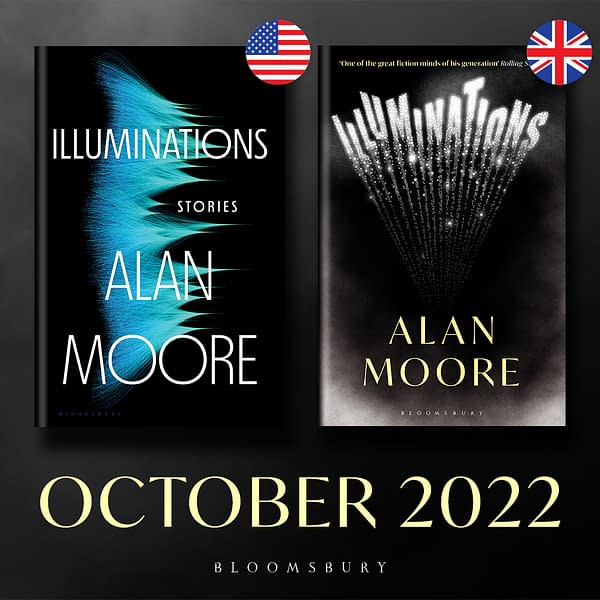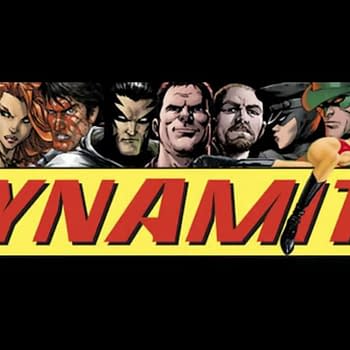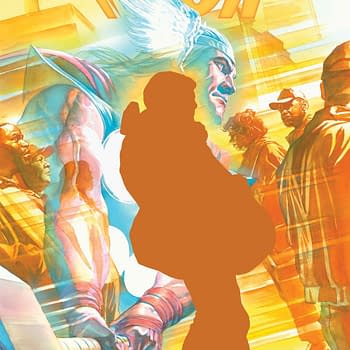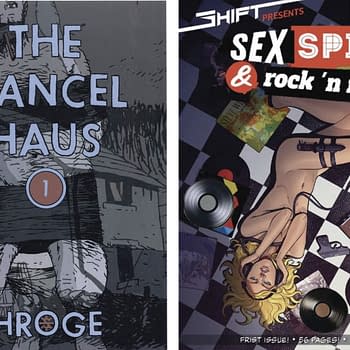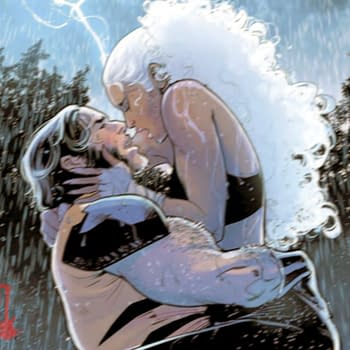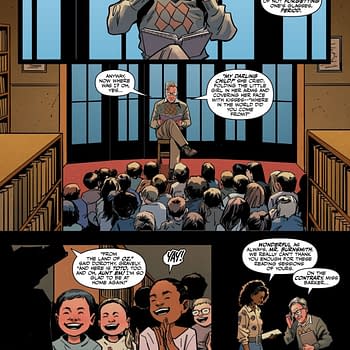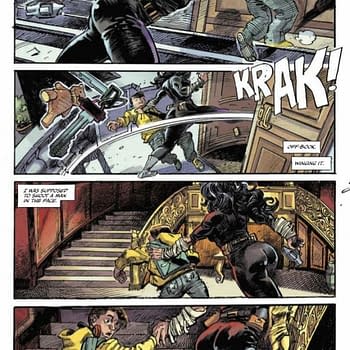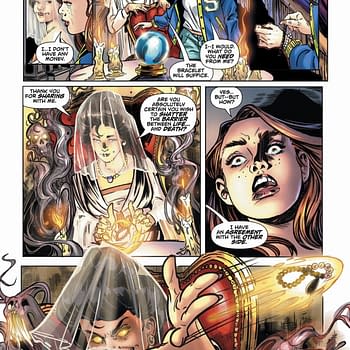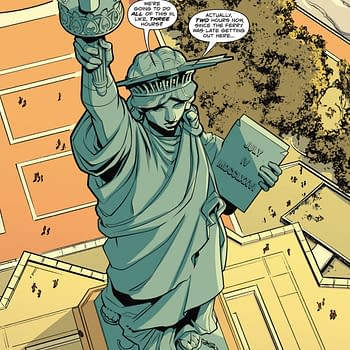Posted in: Comics | Tagged: Alan Moore, illuminations, stewart lee, thunderman
Alan Moore & Stewart Lee on the 'Suppurating Boil of my Comics Career'
In April last year, Bleeding Cool got the scoop that Alan Moore was to publish a collection of short stories, Illuminations out this month, which will include what is anticipated as a takedown on the comic book industry, with "What We Can Know About Thunderman" described as a "monumental novella" that "charts the surreal and Kafkaesque history of the comics industry over the last seventy-five years through several sometimes-naive and sometimes-maniacal people rising and falling on its career ladders, Moore reveals the dark, beating heart of the superhero business." If you live in the UK, the USA or Canada, you can forward any proof of purchase to the publisher Bloomsbury and receive a free badge or pin, depending on your nearest territory.
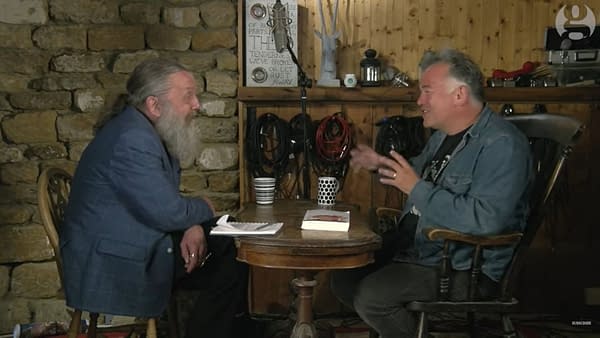
There are also a number of online talks arranged. One with the Guardian newspaper with Stewart Lee, ran yesterday. Lee, who first interviewed Alan Moore for BBC's Radio 4's Chain Reaction back in the day, and has collaborated on a number of projects over the years, including Dodgem Logic and Stewart Lee's Comedy Vehicle. Here are a few highlights – they won't be a substitute for the real thing of course.
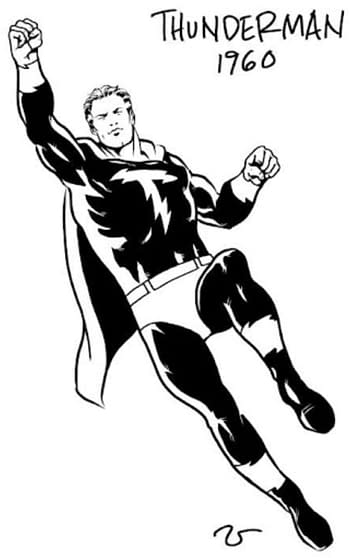
1. The suppurating boil of my comics career.
I would like you to remember that Alan Moore had a very dry self-deprecatory sense of humour, and often says over-the-top statements which are meant to be mockingly self-critical and ironic, and people who take them as straight text and quote them in that fashion are generally bad actors of one stripe or other. So when Alan Moore talks to Stewart Lee about "The suppurating boil of my comics career". He is not being entirely serious. You think you might have been clued in when he says that he achieved some catharsis from writing the What We Can Know About Thunderman story and now has "less dark mutterings" about his time in comics, when in the bath.
2. Neurological addiction.
"If I was going to badmouth the comics industry, I felt I had to talk about why people loved to read these comics." says Alan Moore, emphasising that it's not just bitterness."This is a neurological addiction brought about by chest emblems and colour combinations." Lee mentions a character in the book talking about comics readers being like drug addicts. What We Can Know About Thunderman is divided into chapters with different voices, no omniscient narrator and includes excerpts from media like fanzines.
3. Great British Holiday.
Alan Moore tells a hilarious story about a disastrous recent holiday he took with his wife, Melinda Gebbie, to the British seaside town of Yarmouth, after he made the mistake of telling her about his childhood holidays there that brought him joy, only to turn up and immediately become miserable at it all. It was this experience that partly inspired Thunderman in its commentary on childhood nostalgia. And he had fantasies of lighting on fire the hapless students working summer jobs dressed up as furry cartoon characters on the promenade. Then he was queuing to get into the wax museum and overheard someone ahead saying, "Oh I think that's Hitler" and decided he would be all right after all.
4. "I made it up and it all came true anyway" – From Hell.
"I've got a bit of a track record for making up really unpleasant things for stories and having them become real" says Alan Moore. "And government policy" says Lee as V for Vendetta is getting more and more like a documentary. There's also a story in Illuminations about estate agents (that's realtors, Americans) who show people around property after the world has ended.
5. A less-than-hypothetical lizard.
Alan Moore and Stewart Lee talk about A Hypothetical Lizard included in the book, originally written in the eighties for a fantasy anthology and adapted as comics by Bleeding Cool's own publishers, Avatar Press. The story is about sexual identity and identity theft, is well ahead of its time in LGBTQ and nonbinary representation.
6. Moon And Serpent, snaking towards release.
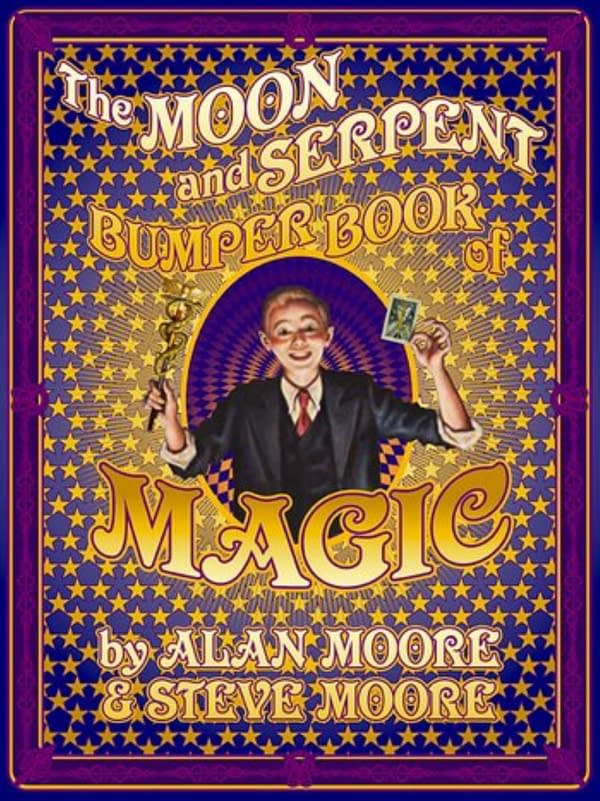
In April, Bleeding Cool reported that Knocakabout publisher Tony Bennett told me that there was now a firm publication date for The Moon and Serpent Bumper Book of Magic for 2023, described as "a clear and practical grimoire of the occult sciences that offers endless necromantic fun for all the family."
Alan Moore told Stewart Lee that it is currently in the final stages of artwork and production including art by his League Of Extraordinary Gentlemen/Cinema Purgatorio collaborator Kevin O'Neill.
7. Not long now, London.
Bleeding Cool also reported in March last year on his series of five novels, Long London. As a Londoner, I am probably more excited about reading Alan Moore's excavation of this fine-and-foul city than anything else he has written since From Hell. H head finished the prologue and is three chapters into the first of the London novels, heavily influenced by the author Arthur Machen, pen-name of Arthur Llewellyn Jones, the Welsh author and mystic of the 1890s and early 20th century, and his horror/fantasy stories. Stewart Lee states "Machen makes living in London into an adventure." Alan sees London as a state of mind, a mythical city in the minds of everyone who thinks about it that's different from the concrete London or reality, and Machen's idea of a reality behind this one.
8. A spoonful of saccharine.
Alan looks at the literary landscape for children. "Most of the stuff I was reading as a 10-year-old doesn't exist anymore. The stuff that does exist I wouldn't recommend to a 10-year-old now." He talks about loving the Mary Poppins stories as a child, but now finding it full of racism, sexism and classism. And the same with T.H. White's Once and Future King. He would still recommend Alan Garner, author of The Owl Service, The Weirdstone of Brisingamen and The Stone Book though. And describes Garner's latest novel Treacle Walker as wonderful. As well as Thomas Pynchon's Entropy and Vladimir Nabokov's Pale Fire influencing him and some of the stories in Illuminations. "I've read some Young Adult literature, and I'm not sure whom it's pitched at." He also talked about his love for comics when he was ten years old, including the Marvel Comics by Jack Kirby, Stan Lee and Steve Ditko before "Marvel became this colossus that's destroying the world."
9. A ghost story for the age.
Illuminations contained a ghost story where he's trying to evoke "that M.R. James feeling" citing Montague Rhodes James, best remembered for ghost stories considered among the best in the genre and redefining the ghost story for the twentieth century. And that "M.R. James' Lost Hearts terrified me as a child." It may also be worth noting that his daughter Leah Moore and his son-in-law John Reppion wrote the graphic anthology, Ghost Stories of an Antiquary, adapting ghost stories by M.R. James, for the 80th anniversary of his death. So he has passed the love on. He also cites Robert Aickman as one of the seminal British ghost story writers. "I really like black dog stories, which are a subset of folklore."
10. Mod music
Alan Moore also says his favourite band at the moment is Sleaford Mods. Stewart Lee says that he knows them – but it's a little more than that. He actually knows them, and has even opened for them. So that went down well… Sleaford Mods' Jason Williamson also narrated Alan Moore's first novel, Voice Of The Fire for the audiobook, and has released some of his readings on vinyl. So that was nice…
Two further free talks will be available on Saturday, the 15th of October. The first with Joseph Beth Books Gifts And Food, in collaboration with the Wisconsin Book Festival, at 10.30am ET. And then again with Brookline Booksmith and speaker Matt Bell, also in collaboration with the Wisconsin Book Festival, at 11.30am ET. You can also buy copies of the book through the event as well.
In his first-ever short story collection, which spans forty years of work and features many never-before-published pieces, international bestselling author and legendary creator of From Hell, The League of Extraordinary Gentlemen and other modern classics, Alan Moore, presents nine stories full of wonder and strangeness, each taking us deeper into the fantastical underside of reality.
In A Hypothetical Lizard, two concubines in a brothel for fantastical specialists fall in love, with tragic ramifications. In Not Even Legend, a paranormal study group is infiltrated by one of the otherworldly beings they seek to investigate. In Illuminations, a nostalgic older man decides to visit a seaside resort from his youth and finds the past all too close at hand. And in the monumental novella What We Can Know About Thunderman, which charts the surreal and Kafkaesque history of the comics industry over the last seventy-five years through several sometimes-naive and sometimes-maniacal people rising and falling on its career ladders, Moore reveals the dark, beating heart of the superhero business.
From ghosts and otherworldly creatures to theoretical Boltzmann brains fashioning the universe at the big bang, Illuminations is exactly that – a series of bright, startling tales from a contemporary legend that reveal the full power of imagination and magic.


